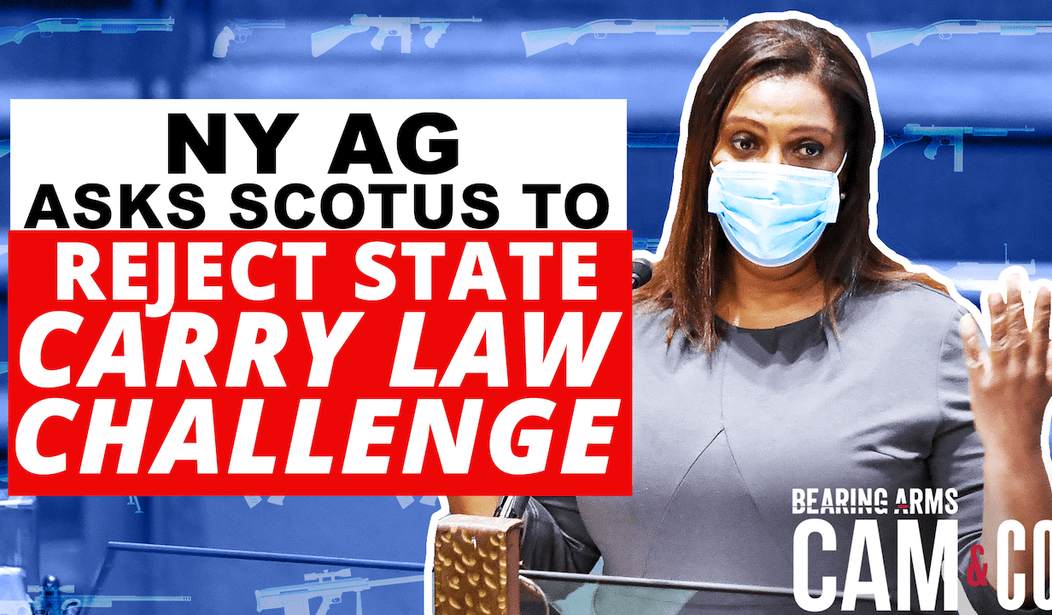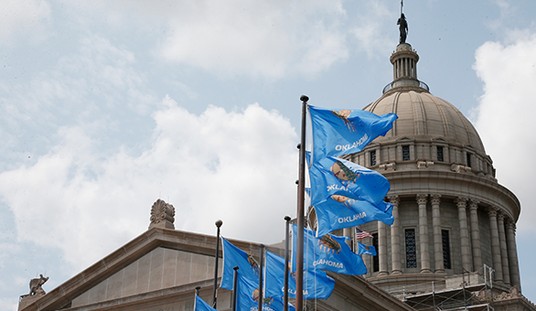A federal lawsuit aimed at striking down New York’s carry laws will be considered in conference by the Supreme Court on March 26th, and New York Attorney General Letitia James has now filed her response with the Court defending the state’s law and urging justices to reject the challenge. On today’s Bearing Arms’ Cam & Co we take a closer look at the brief filed by James and the arguments that she makes, starting with her assertion that the case itself doesn’t actually involve a real challenge to the right to carry or lack thereof.
The challengers in New York State Rifle & Pistol Association vs. Corlett argue that the question before the Court is whether or not “the Second Amendment allows the government to prohibit ordinary law-abiding citizens from carrying handguns outside the home for selfdefense.” In James’ view, however, the real question is “whether the Second Amendment prohibits New York from requiring residents who wish to carry a concealed firearm in public to have an actual and articulable need to do so.”
Not surprisingly, James takes the position that New York’s licensing standards are fully in line with the Second Amendment, even though the law requires applicants to show “proper cause” before a license to carry in self-defense is issued. In other words, under New York law you don’t have a general right to bear arms in defense of yourself or others. Instead, you may be granted the privilege to carry a gun in self-defense as long as the licensing authority determines that your particular circumstances warrant the carrying of a firearm.
James argues that there isn’t really a split opinion among the various courts of appeals, claiming for instance that a D.C. law requiring applicants to show a “justifiable need” to carry that was struck down by the D.C. Circuit Court of Appeals is completely different than the “proper cause” law being challenged in Corlett.
Wrenn involved a regulatory scheme that was far more restrictive than New York’s, and that restrictiveness explains the different outcome in Wrenn. The District of Columbia law at issue in Wrenn, which permitted individuals to obtain a concealed carry license if they could show “a special need for self-defense,” provided that applicants could meet this standard only by alleging “serious threats of death or serious bodily harm, any attacks on [their] person, or any theft of property from [their] person”… The D.C. Circuit construed this requirement as imposing “a total ban on most D.C. residents’ right to carry a gun” for self-defense outside the home. The court then concluded that this “total ban” was per se unconstitutional because it “destroy[ed] the ordinarily situated citizen’s right to bear arms” outside the home.
Unlike D.C.’s old law, James says that the New York law doesn’t operate as a ban.
Unlike the District of Columbia law invalidated in Wrenn, New York’s law does not limit the types of circumstances that applicants may present in seeking to establish a need for self-defense; it requires only that the applicant’s need be “actual and articulable—rather than merely speculative or specious.” New York’s law is therefore “oriented to the Second Amendment’s protections,” id., while recognizing that those protections do not encompass “a right to keep and carry any weapon whatsoever in any manner whatsoever and for whatever purpose.” Contrary to petitioners’ unsubstantiated contention, this licensing standard does not make it “virtually impossible” for ordinary citizens to obtain a public carry license. For all these reasons, Wrenn is readily distinguishable from the decision below and does not present a conflict warranting this Court’s review.
Is there really a distinguishable difference between a “proper cause” requirement and a “justifiable need” requirement? I’d argue that it’s a distinction without a difference, and in both the Wrenn case and Corlett the issue is fundamentally the same; whether law-abiding citizens must attempt to justify their desire to carry a firearm in self-defense in order to exercise their constitutional right to bear arms.
Check out today’s show in the video window above for my rebuttal to James’ argument that the Corlett case is a poor vehicle for the Court to decide this question, as well as her final argument that New York’s carry laws are consistent with the history and tradition of the Second Amendment.
I’m actually surprised that James didn’t rely more on the argument that the Second Circuit has previously upheld New York’s carry laws and that the Corlett case merely seeks to litigate an issue that’s already been decided, and in my opinion she’s failed to offer a persuasive argument against the Supreme Court wading into the conflicting opinions from the various appellate courts. Now we have to hope that four justices agree, and decide to accept the case when it comes up in conference next month.
The Corlett case is a great opportunity for the Court to weigh in on the right to bear arms outside of the home, though if they choose to punt yet again we still the case of Young vs. Hawaii kicking around in the Ninth Circuit. Still, just as gun control activists are getting antsy at the lack of action from Joe Biden when it comes to his gun ban agenda, Second Amendment supporters are equally as anxious for the Supreme Court to take action on a significant case dealing with the infringement of our right to keep and bear arms.









Join the conversation as a VIP Member